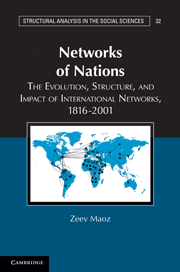Book contents
- Frontmatter
- Contents
- Preface
- Part I What Are International Networks?
- Part II The Formation of International Networks: Theory and Evidence
- 5 Networked International Politics: A Theory of Network Formation and Evolution
- 6 Testing the Theory of Networked International Politics
- 7 Nations in Networks: Prestige, Status Inconsistency, Influence, and Conflict
- Part III The Implications of the Networked International Politics Theory
- Glossary
- Bibliography
- Author Index
- Subject Index
7 - Nations in Networks: Prestige, Status Inconsistency, Influence, and Conflict
Published online by Cambridge University Press: 05 June 2012
- Frontmatter
- Contents
- Preface
- Part I What Are International Networks?
- Part II The Formation of International Networks: Theory and Evidence
- 5 Networked International Politics: A Theory of Network Formation and Evolution
- 6 Testing the Theory of Networked International Politics
- 7 Nations in Networks: Prestige, Status Inconsistency, Influence, and Conflict
- Part III The Implications of the Networked International Politics Theory
- Glossary
- Bibliography
- Author Index
- Subject Index
Summary
Introduction
States care about power, security, and wealth. These goals have tangible and sometimes measurable properties. But power, security, and wealth do not depend only on the internal attributes and characteristics of states; they have intangible elements that derive from the interaction of states with their environments. It is commonly assumed that power is an important determinant of states’ security. Clearly, power has tangible elements. However, the most widely accepted conception of power views it as the ability of an actor to influence outcomes (Maoz, 1989b). In that vein, an important, and often neglected, element of power concerns the structure of exchange relations between a unit and other units (Barnett and Duvall, 2005). In this context, a state’s power derives from the position it assumes in its interactions with other states. Related to this is the conception of psychological power, which has to do with the ability of a state to bring about favorable outcomes or to prevent unfavorable outcomes without using force (Fuller and Arquilla, 1996). In effect, the use of force is seen as a power failure (Tang, 2005).
But beyond power, security, and wealth, states care about their reputation and prestige. A state’s status and prestige may contribute to its national security and well-being. This corresponds to a widely held belief that a state’s status and prestige help it to accomplish its foreign policy objectives. But there is more to the pursuit of status and prestige than a lust for power and influence. When people root for their national soccer team in the World Cup competition, or for their state’s athletes in the Olympic Games, they opt for status and prestige that go beyond the tangible components of security. The same applies to the highly contentious international competition that takes place every four years to host the World Soccer Championship Series and the Olympic games. To understand the totality of international relations, we need to understand the factors that define status and prestige in world politics. More importantly, because states work to increase their status and prestige, it is important to understand how a state’s status and prestige affects its behavior in the international system.
- Type
- Chapter
- Information
- Networks of NationsThe Evolution, Structure, and Impact of International Networks, 1816–2001, pp. 211 - 248Publisher: Cambridge University PressPrint publication year: 2010



